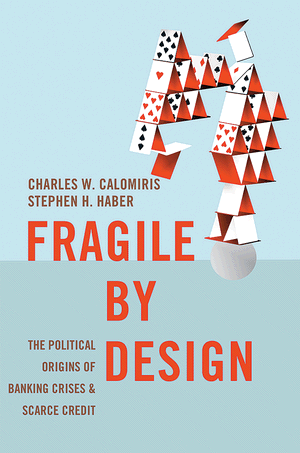 Fragile by Design, by Charles Calomiris and Stephen Haber, is a great book. The authors argue that the stability and efficiency of financial systems in different countries depend on political bargains that set the rules of the game. Authoritarian countries produce inefficient state-owned banking systems because governments cannot commit not to expropriate. But democracies produce a wide range of outcomes, depending on the configuration of constituencies and interest groups. The United States is cursed with a highly unstable banking system because local interests have been able to ensure a huge number of local unit banks that were insufficiently diversified. This system finally broke down thanks to the inflation of the 1970s, but our further misfortune was a political bargain between activist groups and large banks in the 1990s that resulted in a system where banks were encouraged to reduce underwriting standards so as to extend credit to low-income people. Meanwhile, countries like Canada were lucky enough that the initial political bargain at a national level led to a small number of stable and efficient banks that weathered the financial crisis of 2008.
Fragile by Design, by Charles Calomiris and Stephen Haber, is a great book. The authors argue that the stability and efficiency of financial systems in different countries depend on political bargains that set the rules of the game. Authoritarian countries produce inefficient state-owned banking systems because governments cannot commit not to expropriate. But democracies produce a wide range of outcomes, depending on the configuration of constituencies and interest groups. The United States is cursed with a highly unstable banking system because local interests have been able to ensure a huge number of local unit banks that were insufficiently diversified. This system finally broke down thanks to the inflation of the 1970s, but our further misfortune was a political bargain between activist groups and large banks in the 1990s that resulted in a system where banks were encouraged to reduce underwriting standards so as to extend credit to low-income people. Meanwhile, countries like Canada were lucky enough that the initial political bargain at a national level led to a small number of stable and efficient banks that weathered the financial crisis of 2008.
There are a huge number of moving parts and epicycles (why was our unstable system so stable from 1936-1980?, and what explains the success of activists like ACORN?), but the book is nonetheless enormously illuminating, and contains the most powerful and concise account of the causes of the 2008 crisis that I have seen.